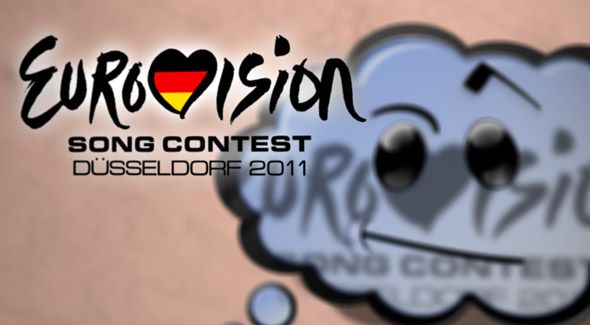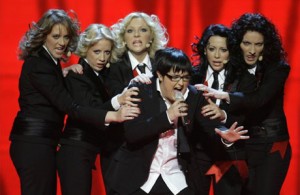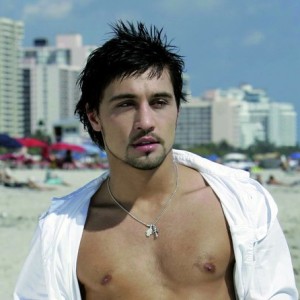 We all have certain pieces of pop culture that turn us into raving evangelicals. Not only do we enjoy them, we insist that others enjoy them as well, and we basically go door to door asking, “Have you heard the good news about The Wire/His Dark Materials/Hunger Games/Game of Thrones/Heavy Rain/Mass Effect 2 etc?” We want everyone to share in the awesomeness. This can be annoying, but it’s actually how pop culture is supposed to work; the “pop” part is word of mouth. Anyone can be a consumer of pop culture, but when you loan somebody your DVD of Friday Night Lights because they have no idea what they’re missing, you’re helping to make pop culture. Without people spending their social capital to support their favorite entertainment, we’re at the mercy of advertising dollars alone, and the possibility for something weird and wonderful to bubble to the surface has been lost. I’d even say we have a responsibility to talk up the things we love. So ladies and gentlemen, my name is Matt, and I’m not going to rest until Americans know about Eurovision.
We all have certain pieces of pop culture that turn us into raving evangelicals. Not only do we enjoy them, we insist that others enjoy them as well, and we basically go door to door asking, “Have you heard the good news about The Wire/His Dark Materials/Hunger Games/Game of Thrones/Heavy Rain/Mass Effect 2 etc?” We want everyone to share in the awesomeness. This can be annoying, but it’s actually how pop culture is supposed to work; the “pop” part is word of mouth. Anyone can be a consumer of pop culture, but when you loan somebody your DVD of Friday Night Lights because they have no idea what they’re missing, you’re helping to make pop culture. Without people spending their social capital to support their favorite entertainment, we’re at the mercy of advertising dollars alone, and the possibility for something weird and wonderful to bubble to the surface has been lost. I’d even say we have a responsibility to talk up the things we love. So ladies and gentlemen, my name is Matt, and I’m not going to rest until Americans know about Eurovision.
I’m actually amazed that Americans don’t know about Eurovision, because it’s not exactly under the radar. According to Wikipedia, it’s “one of the most-watched non-sporting events in the world, with audience figures having been quoted in recent years as anything between 100 million and 600 million internationally.” It’s also been broadcast “to such places as Australia, Brazil, Canada, Chile, China, Egypt, India, Japan, Jordan, Mexico, New Zealand, the Philippines, South Korea, Taiwan, Thailand and Uruguay despite the fact that they do not compete.” Notice any country missing?
Okay, so what is Eurovision? Basically, it’s a live singing contest in which every European nation gets to send one act, and everybody votes on the winner (but to make things interesting, you can’t vote for your own country). More accurately, every member of the European Broadcasting Union gets to send one act, which includes countries like Monaco and Russia which aren’t technically European. This has been going on since 1956, and it’s hard to overstate how big a deal Eurovision is. For instance, Sweden selects its entry with a nationally television competition called Melodifestivalen. In 2007, the finals had 4 million viewers… and the total population of the country was 9 million. That’s just the show to select the Eurovision song. So to put that in perspective, imagine that American Idol had five times as many viewers as it does now, and then the winner went on to compete against the winner of every other nation’s singing contest.
So you can see how I’m surprised that even with the entries splashed all over YouTube, the competition is still virtually unheard of in the States. If nothing else, Americans enjoy feeling superior to Europeans, and the ridiculous Eurovision pop music provides ample opportunity. And make no mistake: this pop music is goddamned ridiculous. The rules specify that the songs can’t have been performed publicly before the previous October, meaning that these are new songs, in many cases written specifically for the contest. It’s a songwriting contest as much as a singing contest.
Eurovision was created in the hopes of bringing the continent together for something other than killing each other. And indeed, the fact that a country’s citizens can’t vote for its own entry means that everyone is trying to win over everyone else. The winners need to find something that resonates from Ireland to Azerbaijan, which largely means some flavor of cheese. The most successful group ever to emerge from Eurovision was a little band called Abba, and that should tell you something.
I think to understand what Eurovision glory looks like, you just need to watch “Believe,” the 2008 winner from Russia, sung by Dima Bilan:
Right off the bat, you’ll notice he’s not speaking Russian. Since they’re courting the voters of all European countries, most competitors choose to sing in English. And perhaps because the songwriters don’t really know what they’re saying, Eurovision lyrics often sound like the journal of a angst-ridden middle school girl. In this case:
Even when the thunder and storm begins
I’ll be standing stong like a tree in the wind
Nothing is gonna move this mountain or change my direction
I’m falling off the sky and I’m all alone
The courage that’s inside is gonna break my fall
Nothing is gonna dim my light within
Okay, fresh-faced tenor, check. Silly lyrics, check. But a successful Eurovision performance really requires some crowd-pleasing stagecraft too. At 35 seconds, you have a man appear with a violin, playing in the exaggerated way you play if you’re in a production of Fiddler On the Roof. This is not just any violin. This is a Stradivarius, and I’m sure a lot of the viewers knew it: Eurovision is covered extensively in the press for months leading up to the competition.
But that’s just the beginning. At 2:00 Dima launches into the second chorus, and an actual figure skater begins to perform right there on stage. This is not just any figure skater. This is Olympic gold medalist and three-time world champion Evgeni Plushenko. Is it a good idea to play a Stradivarius on a sheet of ice, as a figure skater toe loops around you? No it’s not. But you have to admit, it’s something you don’t see everyday.
Then at 2:55, Dima puts the icing on the cake, with a gratuitous high note coupled with an even more gratuitous shirt ripping-open. (I should mention here that Eurovision is very, very popular in the gay community.) There was no beating that song. After his victory, Dima received a congratulatory call from Russian President Dmitriy Medvedev.
Okay, on to 2011. This year’s competition is being held in Dusseldorf, because Germany won last year. There are 43 countries competing. Half will go in a semi-final on Tuesday night, of which 10 will be selected for the finals. The other half will compete Thursday night. Five countries (France, Italy, United Kingdom, Germany, and Spain) will go directly to Saturday’s finals, because they’re the largest financial contributors to the European Broadcasting Union, for 25 countries total.
Got it? Okay, we’re ready to take a look at the songs competing in semi-final #1, which you can watch live tomorrow afternoon at 3 pm EST.




I’m so glad that you’ve taken in upon yourself to inform the US about the epic cheesiness that is Eurovision. I’ve been watching it since I was tiny, and I adore it. What you didn’t really inform people of is the obligatory block voting for neighbouring countries, eg all Scandinavian countries vote for other Scandinavian countries etc. It’s not so much of a problem for the semi-finals, but it does kind of ruin the big show for me. It can also get really political, as in 2003 when no one voted for the UK because of the war in Iraq (OK, the song was also terrible, but that usually doesn’t make a difference in Eurovision). The final thing I’d like to mention is costume changes, which add a lot to the performances but seem to have fallen out of fashion in the past few years, which I think is a real shame. Generally if I see a woman in a long dress start to sing anything other than a ballad, I know that skirt is coming off in time for the key change.
It’s true I didn’t go into bloc voting, because I don’t understand it. I tried to read up on it, got confused, and watched the Switzerland song again instead.
The idea is that the Slavic countries all vote for each other, the Nordic countries all vote for each other, etc, correct? But looking at Eurovision winners, it seems like a lot of different countries are sharing the glory – in fact, there’s barely any repetition at all.
2010 Germany
2009 Norway
2008 Russia
2007 Serbia
2006 Finland
2005 Greece
2004 Ukraine
2003 Turkey
2002 Latvia
2001 Estonia
2000 Denmark
So bloc voting doesn’t seem to preordain a winner. I guess there’s a distinct lack of Western Europe in that list… but I also keep reading how France is a favorite to win this year. So I’m confused. Can you explain how the bloc voting makes the competition less fun?
A couple of years ago they changed it from being entirely viewer’s votes to also having a jury in each country and their votes count for 50% and the remaining 50% is from the viewers. This has stopped a bit of the bloc voting.
But I must say that sometimes it isn’t true about bloc voting. If the song is really crappy not even the neighboring countries will vote for the song. Like in 2002 when we (Denmark) came in last with only 7 points – the winning song had 176 points.
Oh by the way, are you from the UK? If so, you’ve got to share a couple observations about the songs in Semi-Final #2. I’ll put them in my next post.
Whilst bloc voting might not preordain a winner, it certainly promotes mediocre songs to get a lot more votes than they otherwise would. And the songs are generally heavily promoted before the actual event, which means that people in Europe are often familiar with the songs before the voting comes along. I know this is certainly true of the last two years’ winners. They also tend to get singers who are famous in the country/bloc they come from, so there can also be an inbuilt fanbase before the event, although that backfired majorly when Russia entered Tatu a couple of years ago. But the main reason why bloc voting takes away enjoyment is in the semi finals, when songs get through because of where they are from rather than the quality of the performance.
I am in the UK, but am half Belgian half Swiss, but I’ll be sure to check out the songs for semi-final 2 and let you know what I think. But of course I’ll be voting for Switzerland, as Belgium’s entry seems to be lacklustre this year, despite us coming 6th last year.
I don’t think the bloc voting is really as big a thing or nearly as political as people make it out to be. As I understand it it’s really just more about neighbouring countries obviously having shared cultural standards and tastes and reference to draw upon.
For instance the Russian winner a few years ago who got the votes of most of the other Slavic countries, if I recall correctly was actually already a successful popstar with a large following in all of those countries. So I think it’s less about politics and much more about common cultural experience.
The only reason I’ve evr found to watch Eurovision is the wonderful commentary we get here in the UK from Sir Terry Wogan, with just the right amount of the verbal equivalent of a knowing wink.
http://www.youtube.com/watch?v=fAI7epAILRU
(look out for him making himself laugh at Spain’s entry. It’s also worth pointing out that Finland won that year.)
Of course, there’s the greatest Eurovision entry ever to consider: http://www.youtube.com/watch?v=jzYzVMcgWhg
We use to get Terry Wogan’s commentary in Australia as well. Sadly, no more.
Generally the bloc voting doesn’t hamper the end result too much. It’s just that it gets kind of annoying that obviously terrible songs/performances get big scores because of the bloc they belong to. But at least Terry always let you know why the Russians (or whoever) had such poor taste.
The singing in English gets really annoying too. I could never understand why they make that much effort to sing in English when so often it comes out sounding terrible and struggles to make sense. Matt, you mentioned that it was an attempt to appeal to a wider audience but I’ve yet to meet anyone who thought it was a good idea. Including my friends and relatives in Europe.
Also, http://www.youtube.com/watch?v=-n–JnAwirk – one of the greatest Eurovision entries ever. A real travesty that it never made it to the final! :’)
And a classic and brilliant piece of satire from the master that is Neil Innes – http://www.youtube.com/watch?v=qEPFKy8Yqm0
Small thing: Pretty sure Monaco is European and you mean Morrocco?
Morocco isn’t in Eurovision…although it’s always annoyed me that Israel gets to compete, and isn’t even remotely European.
You don’t really need to be European to compete – just a member of the European Broadcasting Union. Israel’s a member, so they get to compete.
That’s also how Morocco got to compete in 1980, and places like Lebanon get to compete. Egypt, Tunisia, Algeria and even Libya are technically able to enter.
You’re both right. I meant Morocco, which I pulled from a list of countries which HAVE participated in Eurovision. Apparently, Morocco was in the contest exactly once, in 1980. They finished second to last and never came back.
I agree that Israel seems definitely not European. But so does Russia! Parts of Russia are thousands of miles away from Europe. You can see Sarah Palin’s house from Russia.
Well, there goes the rest of my evening.
How did I not know about this until now!?
A portion of it is linked above, but this Father Ted episode captures a lot of the magic of Eurovision
http://smotri.com/video/view/?id=v1039089c114
(Note; link is a probably-copyright infringing Russian website…)
It’s 3:30 am and I have to go to work early !!!DAMN YOU EUROVISION!!!
P.S.
Father ted seems awesome…
This isn’t the first time that Eurovision has played a role in Portuguese politics, either.
In 1974, the Carnation Revolution started with the broadcast of a Eurovision song, E depois do Adeus, or “And After the Goodbye”.
I think that event, combined with current – shall we say, unhappiness – with the Portuguese Government, had a big impact on the selection of Portugal’s entry this year.
I have Lordi to thank for adding the word “a-rock-alypse” to my vocabulary back in 2006. It comes in handy more often than you’d think.
Are you familiar with the Adult Swim cartoon Metalocalypse? I’d recommend giving it a try.
I read the entire article, and I look forward to Wednesday morning. However, I could only manage 2.5 songs before this became a ‘read-only’ experience.
With regards to San Marino, they are a real-life Duchy of Grand Fenwick. You see pretty much all of the mountaintop republic in the video. Regarding their history, they have managed to stay independent through the unusual method of politely asking people to leave them alone. They were neutral in both World Wars, thanks to not having anything either side wanted. And when your troops are armed with crossbows, you’re probably going to be staying out of wars anyway. Their chief industries seem to be tourism and reminding people that they really exist by entering international competitions like this one.
I might be slightly out-of-topic but the Eurovision always reminds me of one of the weirdest way it entered pop culture in my country (France).
You often hear that the length of a Eurovision song (exactly three minutes) is exactly the time it takes to strangle someone to death. Everytime someone mentions Eurovision, there’s a good chance that someone else will point out that a successful strangulation should be made to the tune of a Eurovision song.
The creepiness of that statement can be effectively used to conceal a genuine appreciation for the event’s total cheesiness.
Ah Eurovision! It’s great to see it up on our favourite nerd- sites! Though I don’t think you’ve actually managed to capture the scope of the Swedish contest: the thing is, that it consists of 32 songs that are successively elimineated through no less than 4 semi finals, one final to capture some of the runners up and one big final, all in the space of six weeks. Then there are a few weeks of resting time until some “midly” racist jury starts to pick apart the entries of all other countries, also over the space of four weeks. Then there is the grand finale. What does all of this mean? It means that from early january to the middle of may, the Eurovision song contest rests on the public conciousness. I don’t even think there is another country in europe that can beat that kind of ESC exposure. (Oh, and some standard trash talk: the Swiss entry isn’t Jason Mraz, as it is Colby Calais. The refrain is pretty much wholesale lifted from Bubbly)
Quick well, actually. Monaco is European, in that it is in Europe. The EBU predates the EU, it’s not some sinister federalist plot… yet.
Substantive thoughts (when I’ve read the article) to come later…
“Controversially, the Russian network Channel One decided to just pick the country’s Eurovision representative by itself, instead of through a voting process.”
See also, Dimitri Medvedev.
I’ve just been catching up on the live performances, and Croatia had 3 costume changes, and bucked the trend by going from a smaller dress to successively longer dresses. And features a guy in an amazing top hat.
http://www.youtube.com/watch?v=F4FXdxh0iHE
The “European Broadcasting Area” is bounded on the west by the western boundary of Region 1 (see below), on the east by the meridian 40° East of Greenwich and on the south by the parallel 30° North so as to include the western part of the USSR, the northern part of Saudi Arabia and that part of those countries bordering the Mediterranean within these limits. In addition, Iraq, Jordan and that part of the territory of Turkey lying outside the above limits are included in the European Broadcasting Area.